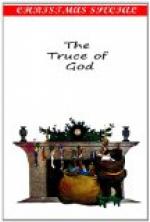“What have you done with the child?”
“The child?”
“Out with it,” cried Charles and flung himself from his horse. If the Jew were haggard, Charles was more so, hard bitten of terror, pallid to the lips.
“I have seen no child. That is—” He hastened to correct himself, seeing Charles’ face in the light of a torch. “I was released by a child, a girl. I have not seen her since.”
He spoke with the simplicity of truth. In the light of the torches Charles’ face went white.
“She released you?” he repeated slowly. “What did she say?”
“She said: ‘It is the birthday of our Lord,’” repeated the Jew, slowly, out of his weary brain. “‘And I am doing a good deed.’”
“Is that all?” The Jew hesitated.
“Also she said: ‘But you do not love our Lord.’”
Charles swore under his breath. “And you?”
“I said but little. I—”
“What did you say?”
“I said that her Lord was also a Jew.” He was fearful of giving offence, so he hastened to add: “It was by way of comforting the child. Only that, my lord.”
“She said nothing else?” The seigneur’s voice was dangerously calm.
The Jew faltered. He knew the gossip of the town.
“She said—she said she wished two things, my lord. To become a boy and—to see her mother.”
Then Charles lifted his face to where the stars were growing dim before the uprising of the dawn, and where, as far away as the eye could reach and as far again, lay the castle of his cousin Philip of the Black Beard. And the rage was gone out of his eyes. For suddenly he knew that, on that feast of mother and child, Clotilde had gone to her mother, as unerringly as an arrow to its mark.
And with the rage died all the passion and pride. In the eyes that had gazed at Joan over the parapet, and that now turned to the east, there was reflected the dawning of a new day.
* * * * *
The castle of Philip the Black lay in a plain. For as much as a mile in every direction the forest had been sacrificed against the loving advances of his cousin Charles. Also about the castle was a moat in which swam noisy geese and much litter.
When, shortly after dawn, the sentry at the drawbridge saw a great horse with a double burden crossing the open space he was but faintly interested. A belated peasant with his Christmas dues, perhaps. But when, on the lifting of the morning haze, he saw that the horse bore two children and one a girl, he called another man to look.
“Troubadours, by the sound,” said the newcomer. For the Fool was singing to cheer his lack of breakfast. “Coming empty of belly, as come all troubadours.”
But the sentry was dubious. Minstrels were a slothful lot, averse to the chill of early morning.
And when the pair came nearer and drew up beyond the moat, the soldiers were still at a loss. The Fool’s wandering eyes and tender mouth bespoke him no troubadour, and the child rode with head high like a princess.




